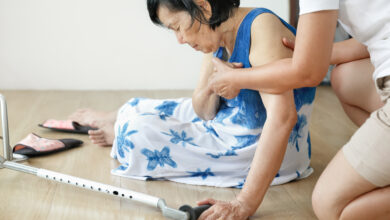Removing the mystique of death
Internationally recognised palliative care nurse Molly Carlile spoke to Amie Larter about her career, recent awards and thoughts on the future of nursing.
When did you realise you wanted to have a career in nursing?
I fell into nursing through circumstance and if I'm honest, struggled for the first couple of years. The change for me came when I looked after my first dying patient.
It was then I knew I'd found my purpose and from that point on, I specialised in palliative care and my subsequent studies and experience were guided by what I needed to learn to help people die in a way that was right for them.
I knew I needed to be able to support grieving patients and families so I studied counselling, then grief and loss, as well as education to be able to teach young nurses how to care for dying patients.
I then went on to study management and leadership, so I could make sure that structures were in place to support person-centred care for dying patients and families. Finally, I became drawn to health promotion by the need to inform and educate communities so that death would no longer be a taboo subject and that people would feel confident to support grieving friends, families and neighbours.
Is this how you acquired the title 'Deathtalker' and what does it involve?
I call myself the Deathtalker because that's what I do. I encourage people to talk about death in order to become better informed and empowered to have meaningful conversations in their families and in the wider community. What does dying look like? What happens? What can I say to a dying or grieving person? How can I help?
These are all questions that the public struggle with, because no one has conversations about stuff that matters. I try to raise awareness by speaking at public events, in the media and at conferences, etc, and have written books and plays as a way of getting people to think about these issues.
What does your current Monday to Friday job role entail?
I manage palliative care services at Austin Health in Melbourne. We have a 20-bed unit and an acute consultancy team that provides services to our acute tertiary hospital. My role is a strategic and operational one. I'm responsible for ensuring that patients and families get the best possible care, that staff are supported in providing that care and that our services constantly evolve based on the needs of people in our community.
I'm also responsible for planning the transition of our services into the new Olivia Newton-John Cancer and Wellness Centre, which will open for inpatient services in July, so there's lots going on at the moment. My other role is as manager of arts in healthcare at the cancer and wellness centre, which involves planning an integrated arts program for the centre that will humanise the facility and provide arts based programs that engage patients and families and create a "safe space" for them.
What prompted your passion for generating awareness of death and grief issues for nurses?
Nurses are no different from the general public, we are a people first, nursing is just what we do, so lots of nurses have the same "hang-ups" as everybody else. Most nurses choose their career because they want to make people better, they want to make a difference and when they are caring for a person for whom cure is an unrealistic expectation, they feel like they've failed and they take it personally.
This can really eat away at them. They too, don't know what to say, don't know what to do - they feel like they can't make a difference. But you know what? They can. They can make a huge difference, by connecting with the person, listening, supporting, nurturing and allowing the person to express their fears and concerns, a nurse can change a dying person's whole experience and facilitate a "good death" as defined by that person. So I try to get nurses to explore their own feelings about death, their own "hang-ups" and reflect on how their personal views can influence the care they provide to dying patients.
What advice do you have for nurses that are regularly faced with death?
Understand yourself first. What are your fears and apprehensions you have about your eventual death? What does a "good death" look like to you? What are the elements of caring for dying people that stress you? Once you are more self-aware, you are better able to establish self-care practices that ensure your resilience and once you are more resilient you are better equipped to provide truly individualised care for patients that is not influenced by your own judgments, beliefs and values. Self-awareness, self-knowledge and self-care ... that's the trifecta!
You received an international, national and state award last year. What were the awards and what were they recognising?
I received the International Journal of Palliative Nursing Educator of the Year Award in London, in March, for my work in educating nurses about death, grief and palliative care. The Deakin University and HealthSuper Leadership in Nursing and Midwifery Award was for outstanding leadership and commitment to the profession, for my work promoting and educating nurses. And the Minister's Award for outstanding achievement by an individual or team in healthcare, at the 2012 Victorian Public Healthcare Awards was for work in palliative care in the public health environment and for my health promotion work in the community.
Email: [email protected]




